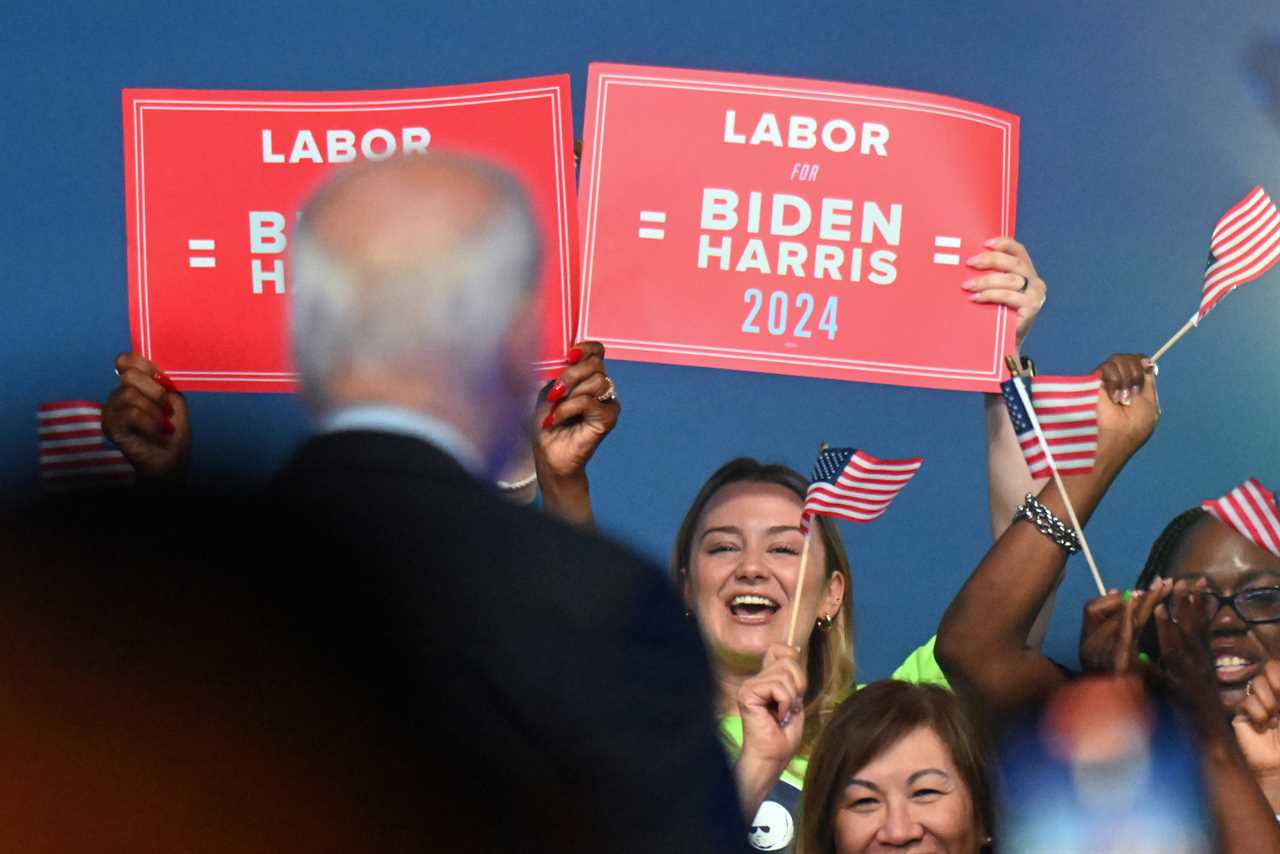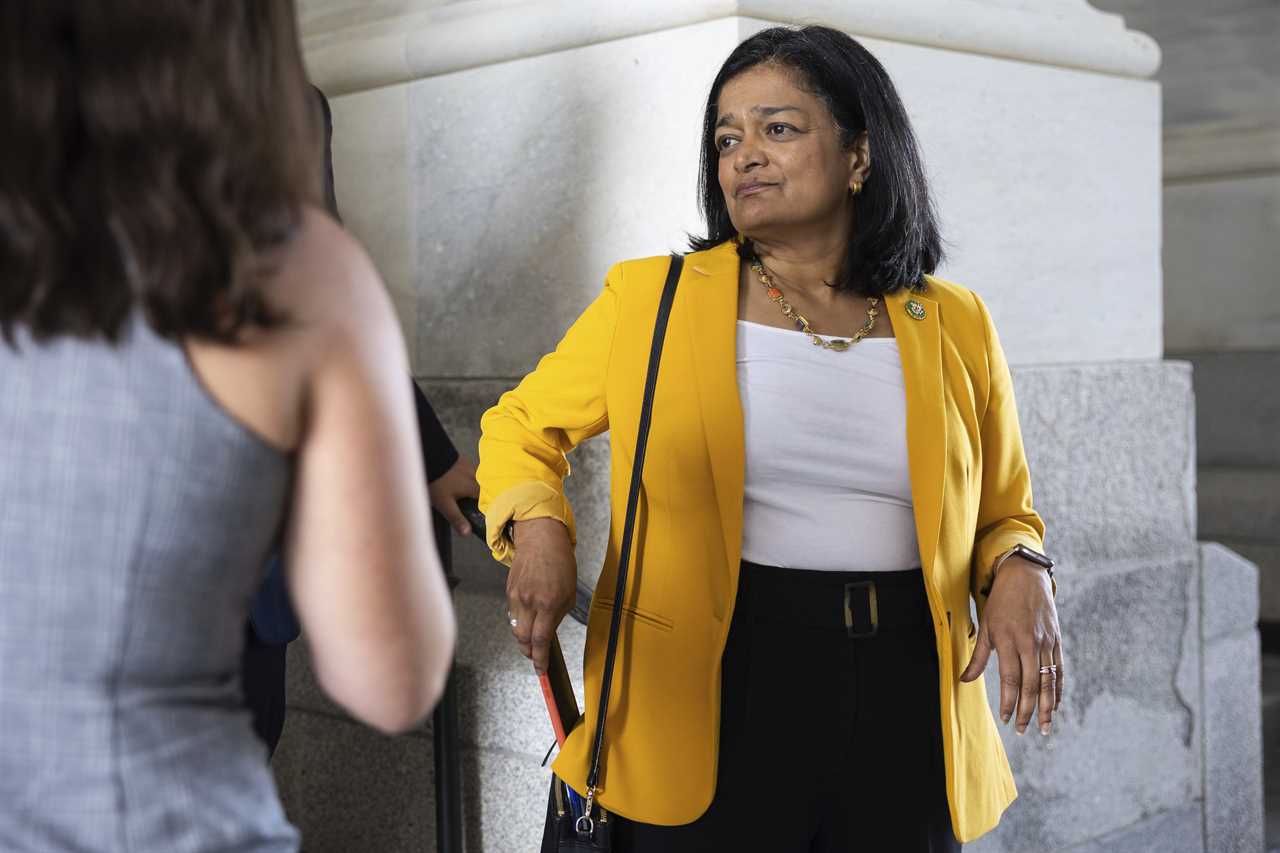
Joe Biden likes to call himself the “most pro-labor union president” in American history. He’s deployed a “Union Joe” image in countless campaigns.
But behind closed doors, the relationship between Biden world and a corner of Big Labor has been rockier than advertised. And it could soon get worse.
Within a matter of months, or even weeks, Biden could find himself dealing with multiple major workers’ strikes that threaten to rock the economy ahead of the presidential election.
Already, one labor group is creating difficulties for Biden. The United Auto Workers, a powerful union with a base in the critical battleground state of Michigan, is withholding support from the president for the time being. UAW’s new president — the tough-talking, left-leaning Shawn Fain — has bashed the administration for doling out billions in subsidies for electric vehicles without demanding higher wages and other protections. Current and former Biden aides and allies are miffed and perplexed by the non-endorsement, according to several people familiar with their thinking, and Democrats are bracing for a likely strike when the UAW’s contract ends in September.
A potential work stoppage by the Teamsters of UPS, which handles a quarter of the country’s parcel shipments, is also looming when their contract ends July 31. And actors and writers are already striking in Hollywood, in what may be the highest-profile union battle of all.
Taken alone, each standoff presents complications for the White House. Taken together, it is a profoundly difficult test for the president: whether to side with a constituency that’s been a bedrock throughout his career or lean on them right as he’s set to face off against Donald Trump, who is gunning for the UAW endorsement after winning the backing of many rank-and-file union members seven years ago.
Biden has few tools available to fix the problem. Labor leaders and top Democrats are urging Biden to stay out, and Teamsters president Sean O’Brien has repeatedly told the White House to not intervene if the union strikes.
In interviews with POLITICO, senior Biden administration officials did not rule out the possibility of the president getting involved, but they also pointed to his pro-labor bona fides to suggest that he likely wouldn’t unless both sides asked him to.
“I will say, it's really important to realize where we've been and what the president continues to say,” said Celeste Drake, deputy director of the National Economic Council. “He met with young workers on Monday and emphasized with them his support for the right to organize and the right to collectively bargain, and by the way, the right to strike. So his commitment to all of those has been clear.”
Marty Walsh, Biden’s former secretary of Labor, likewise said he only sees Biden getting involved if he is asked.
“If you have a general president or a company that doesn’t want your intervention, then your best bet’s not to be involved in it and just ... monitor the situation and see what happens,” said Walsh. “He’s been hands-off up to this point.”
But Biden has intervened in a labor standoff before to prevent a rail strike, angering his labor allies. And he will be challenged to do so again if several work stoppages take place simultaneously, rattling the nation’s economy. The concern among some progressives is that short-term election considerations may lead to bad long-term outcomes.
“Sometimes the best thing that they can do is stay out of it,” Rep. Alexandria Ocasio-Cortez (D-N.Y.) said in an interview. Ocasio-Cortez recently met with Fain and O’Brien and said “their big ask was for the White House to stay out of it and to not intervene. That was their message. Sometimes the workers are just asking not even for help, but to not put your thumb on the scale.”
Biden administration officials said that the rail strike last year was a unique situation in which the president had to protect the economy. He also had the power to sign legislation to impose a contract on the rail workers under the Railway Labor Act. When it comes to the UAW, Teamsters and other unions, his authority is more limited.
Biden officials downplayed the likelihood that there would be a major financial fallout if UAW and Teamsters strike, saying that the economy is resilient and supply chains are healing.
The fact that Biden’s team and UAW’s brand-new leadership are just getting to know each other, however, could make it more difficult for the president to navigate this perilous moment.
Privately, some Democrats said the White House was caught off-guard by Fain’s ascension to the top of UAW. They described Biden’s team as currently being in an information-gathering mode about the union’s new leadership — a stark contrast from the close relationship it had enjoyed with former UAW president Ray Curry.
Other Democrats said the White House was clearly aware of Fain’s criticism of how the Biden administration had dolled out federal funds. But privately, some people in Biden’s orbit have continued to express worries that there’s distance between his agenda and a major union representing voters in a state key to his reelection. Biden’s senior staff has told allies “that the rhetoric from the new UAW leadership is concerning, this is a problem, and we’ve got to figure this out together,” according to a person familiar with the administration’s thinking.
The UAW and the Teamsters now “have new leadership that wants to go hard against the companies and hard against the government if the government isn’t doing what they think they should be doing,” said Todd Tucker, director of industrial policy and trade at progressive think tank the Roosevelt Institute. “That’s part and parcel of the growing militancy of the U.S. labor movement and I think it’s something Biden will be responsive to.”
Asked for comment for this story, the Teamsters referred POLITICO to a statement by O’Brien thanking lawmakers for letters pledging to stay out of the union’s negotiations with UPS. The UAW’s Fain told reporters this week that “we’re trying to do the right thing for our members right now.”
Looming over the emerging tensions between labor and the White House is the election.
Trump is making a play for the UAW’s endorsement. While the former president doesn’t appear to have a chance of landing it (Fain made clear earlier this year that UAW would not back Trump, calling his potential return to the White House a “disaster” in a memo) he could try to recreate what he pulled off in 2016, when he failed to win the endorsements of unions but wooed many rank-and-file members.
Biden is facing pressure from not only the right, but also the left, over his handling of electric cars.
On Tuesday, the Congressional Progressive Caucus met privately with senior Biden adviser John Podesta and peppered him with questions about how the White House can ensure that the jobs being created under Biden’s signature pieces of legislation — from his climate bill to the CHIPS Act — are good-paying, union jobs.
Federal grants and loans already have gone to right-to-work states, which bar unions from collecting mandatory dues, and the largely nonunionized battery industry. That’s worrying progressives and organized labor that the Biden administration is unwittingly setting a lower floor for worker standards in an emerging sector crucial to the president’s climate and economic agenda.
“We were asking, ‘What are we going to do to make sure that these are union jobs?’” said Rep. Pramila Jayapal (D-Wash.), chair of the Congressional Progressive Caucus. “And I think the intent is there. I do think this is the most pro-labor president in history, but I also think that we need to be a lot more focused.”
If Democrats don’t get this right, Jayapal said, it could both hurt them politically and threaten the transition from gas-powered cars to electric vehicles. “I’ve been very concerned about that,” she added.

But the U.S. battery industry is just now developing, in large part due to the Inflation Reduction Act and bipartisan infrastructure law. Unionization efforts have barely gotten off the ground at companies that are putting down roots here.
“This agenda is just getting started,” said Joelle Gamble, deputy director of the National Economic Council. “I think it is far too soon just to comment on a nascent industry where we're still seeing shovels put in the ground, where production hasn't started in many cases.”
Jayapal’s sentiments echo UAW’s leadership, which in June chastised the Biden administration over a $9 billion Energy Department loan to Ford for facilities in the right-to-work states of Kentucky and Tennessee. In October, the first $2.8 billion round of grants for battery makers from the bipartisan infrastructure law went to 20 companies that were almost entirely non-union.
Some Democrats in key battlegrounds have sided with UAW on their complaints, placing additional pressure on Biden. Rep. Dan Kildee (D-Mich.) said the Biden administration should steer federal grants and loans for building the next wave of electric cars to more union-friendly locations.
“It's a matter of targeting in the places where we have historically good jobs working in the auto industry,” he said. “If you come to Michigan, for example, is a different question than going to a place that does not have a history of labor rights.”
Gamble said that “it’s important that we have investments in communities all across America” but argued that the administration is doing what it can to use federal incentives to boost labor standards. She cautioned that federal awards are in their early stages.
“There's been lots of grant dollars that are going to a variety of companies across the United States, including grants going to unionized firms,” she said. “I wouldn't draw too much of a conclusion from the first tranche.”
One thing that could alleviate some of the tension, Democrats concede, is a better relationship at the top.
When Fain made a trip to Washington this week to meet with Biden’s top staff and congressional members, Biden learned of the gathering and asked if he could talk privately with the UAW head, a White House official said. During their conversation, Fain pushed Biden to use his “bully pulpit” and demand that companies that receive federal grants and loans under the Inflation Reduction Act meet stronger labor standards, according to a UAW aide.
“It's a new leadership team at the UAW. These relationships have to be built and they are being built. Sometimes that's more difficult when there's a lot of pressure,” Kildee said.
----------------------------------------
By: Holly Otterbein and Zack Colman
Title: ‘Union Joe’ Biden suddenly finds himself with a number of labor problems
Sourced From: www.politico.com/news/2023/07/23/joe-biden-labor-problems-00107673
Published Date: Sun, 23 Jul 2023 06:00:00 EST






